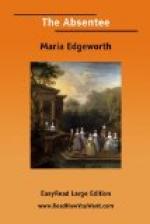manner seemed struggling in all her gestures, and
in every syllable that she articulated—a
naturally free, familiar, good-natured, precipitate,
Irish manner, had been schooled, and schooled late
in life, into a sober, cold, still, stiff deportment,
which she mistook for English. A strong, Hibernian
accent, she had, with infinite difficulty, changed
into an English tone. Mistaking reverse of wrong
for right, she caricatured the English pronunciation;
and the extraordinary precision of her London phraseology
betrayed her not to be a Londoner, as the man, who
strove to pass for an Athenian, was detected by his
Attic dialect. Not aware of her real danger, Lady
Clonbrony was, on the opposite side, in continual
apprehension, every time she opened her lips, lest
some treacherous A or E, some strong R, some puzzling
aspirate, or non-aspirate, some unguarded note, interrogative
or expostulatory, should betray her to be an Irishwoman.
Mrs. Dareville had, in her mimickry, perhaps a little
exaggerated as to the TEEBLES and Cheers, but
still the general likeness of the representation of
Lady Clonbrony was strong enough to strike and vex
her son. He had now, for the first time, an opportunity
of judging of the estimation in which his mother and
his family were held by certain leaders of the ton,
of whom, in her letters, she had spoken so much, and
into whose society, or rather into whose parties,
she had been admitted. He saw that the renegade
cowardice, with which she denied, abjured, and reviled
her own country, gained nothing but ridicule and contempt.
He loved his mother; and, whilst he endeavoured to
conceal her faults and foibles as much as possible
from his own heart, he could not endure those who dragged
them to light and ridicule. The next morning
the first thing that occurred to Lord Colambre’s
remembrance when he awoke was the sound of the contemptuous
emphasis which had been laid on the words Irish
absentees! This led to recollections of
his native country, to comparisons of past and present
scenes, to future plans of life. Young and careless
as he seemed, Lord Colambre was capable of serious
reflection. Of naturally quick and strong capacity,
ardent affections, impetuous temper, the early years
of his childhood passed at his father’s castle
in Ireland, where, from the lowest servant to the
well-dressed dependant of the family, everybody had
conspired to wait upon, to fondle, to flatter, to
worship, this darling of their lord. Yet he was
not spoiled—not rendered selfish.
For, in the midst of this flattery and servility, some
strokes of genuine generous affection had gone home
to his little heart; and, though unqualified submission
had increased the natural impetuosity of his temper,
and though visions of his future grandeur had touched
his infant thought, yet, fortunately, before he acquired
any fixed habits of insolence or tyranny, he was carried
far away from all that were bound or willing to submit
to his commands, far away from all signs of hereditary




